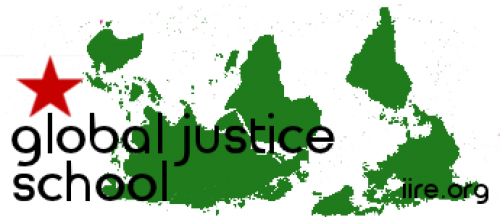Successful Global Justice School
A highly successful school on the theme of globalization took place at the IIRE over three weeks in June 2005. There were in all 21 participants (counting the two interpreters, who both took an active part in the school). Of these 6 were from Asia, 7 from Europe and 8 from Latin America. Seven of the participants were women. The school took place in English and Castilian, with roughly half the participants participating in each language.
The programme approached the question of globalization and the global justice movement from several angles. The first sessions dealt with the economic and social effects of globalization - transformations in the working class, the effect of migrations, land and the peasantry, the effects of globalization on women and the struggles of lesbian/gay/bisexual/transgender people, particularly in the Third World. Subsequently the programme moved on to questions like the effects of globalization on the nation state, the national question, communalism and 'identity politics'. One session was devoted to the influence on politics of religious fundamentalism. Two sessions dealt with the question of developing alternatives to neoliberal globalization. The final sessions of the school centred on political recomposition, the emergence of new parties, the relations between parties and movements, the need for a new internationalism.
Several hot issues came up again and again from report to report, showing that they are on activists' minds around the world. Participants were hungry for information about China, for example: the extent of its challenge to US world power, how fast its economy is likely to keep growing, and what the chances are that the labour movement and other movements can have an independent impact on Chinese society and politics. There was a sense of excitement about Venezuela's Bolivarian revolution; Hugo Chávez's speech at this year's World Social Forum made him internationally known as an adversary of neoliberalism, but people were unsure about how far Venezuelan radicals can go in transforming their country. Events in Europe have also evoked strong opinions from non-Europeans; even fervent opponents of fundamentalism from Muslim countries for example raised questions about the ban on headscarves in French public schools.
Those who took part in the school were political activists, usually with leadership responsibilities in their organizations, and activists in social movements. The evaluation they made at the end of the school showed that they had found it very useful, and that it had enabled them to discuss questions that there is not usually time to discuss in the hurly-burly of political activity. Some felt that the programme was a bit heavy and that it could perhaps have been stretched over four weeks instead of three. But that would have posed other problems, since most of the participants do not work fulltime for social organizations but had had to take time off work to come to the school. In any event the majority of the participants expressed their eagerness and commitment to share their insights from the school more broadly in their organizations and to encourage more activists to participate in the IIRE's upcoming sessions.

